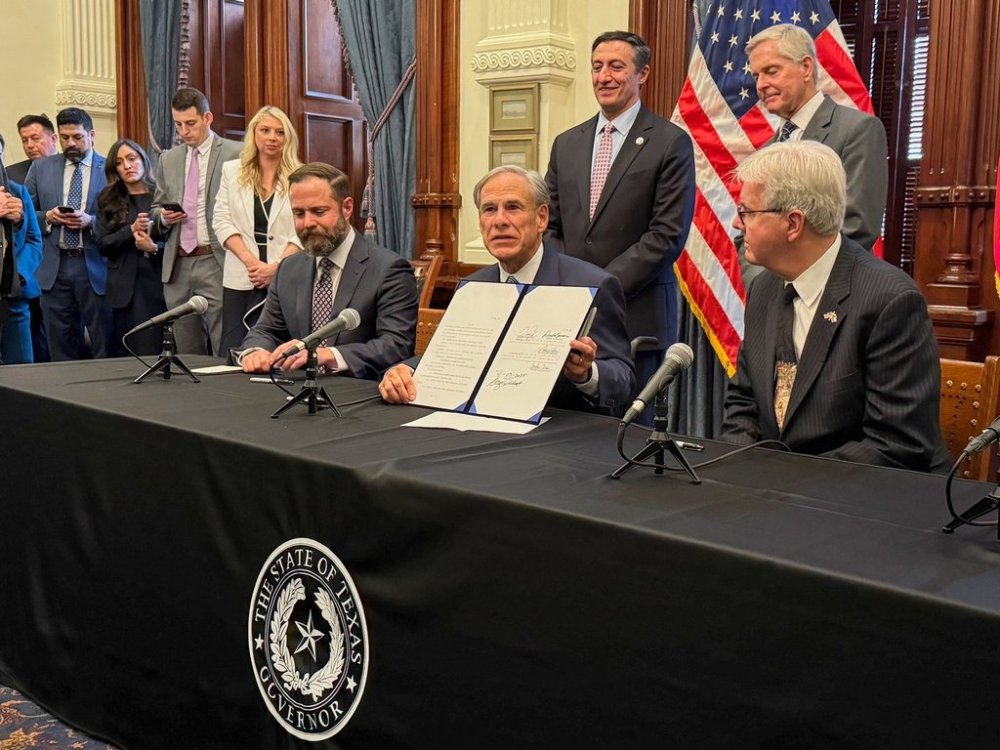Texas governor signs bill creating another DOGE-inspired effort at the state level
Advertisement
Read this article for free:
or
Already have an account? Log in here »
To continue reading, please subscribe:
Monthly Digital Subscription
$0 for the first 4 weeks*
- Enjoy unlimited reading on winnipegfreepress.com
- Read the E-Edition, our digital replica newspaper
- Access News Break, our award-winning app
- Play interactive puzzles
*No charge for 4 weeks then price increases to the regular rate of $19.00 plus GST every four weeks. Offer available to new and qualified returning subscribers only. Cancel any time.
Monthly Digital Subscription
$4.75/week*
- Enjoy unlimited reading on winnipegfreepress.com
- Read the E-Edition, our digital replica newspaper
- Access News Break, our award-winning app
- Play interactive puzzles
*Billed as $19 plus GST every four weeks. Cancel any time.
To continue reading, please subscribe:
Add Free Press access to your Brandon Sun subscription for only an additional
$1 for the first 4 weeks*
*Your next subscription payment will increase by $1.00 and you will be charged $16.99 plus GST for four weeks. After four weeks, your payment will increase to $23.99 plus GST every four weeks.
Read unlimited articles for free today:
or
Already have an account? Log in here »
Hey there, time traveller!
This article was published 23/04/2025 (206 days ago), so information in it may no longer be current.
AUSTIN, Texas (AP) — Texas Gov. Greg Abbott signed a bill Wednesday creating an office inspired by the Department of Government Efficiency and aimed at reducing state regulations, joining other Republican governors who have pledged their own versions of billionaire Elon Musk’s cost-cutting group.
In establishing the Texas Regulatory Efficiency Office, Abbott welcomed cutting regulations and putting stricter standards on new ones. He made no mention during a ceremonial bill signing at the state Capitol of intentions to slash jobs like DOGE, which has divided the country.
“The regulatory environment in Texas is getting too burdensome,” said Abbott, who made the bill the first he has signed this year. “It will put a check on the growth of the administrative state in Texas.”

The law also states that courts are not required to comply with a state agency’s interpretation of its rules or regulations in legal challenges.
More than 20 states have initiated DOGE-style efforts to varying degrees. Most have done so by introducing legislation to create DOGE offices or have created their own legislative committees. Some, such as Texas, have done both; in January, Texas House lawmakers created a DOGE legislative committee, which has primarily worked to audit and modernize dated technology in state agencies.
The governors of Montana, Oklahoma, Iowa, New Hampshire, Florida and Louisiana have issued executive orders to create state DOGE departments.
In Texas, leaders of the state’s employee union dismissed the bill as adding a layer of bureaucracy instead of eliminating one.
“The definition of ‘efficiency’ is being stretched beyond recognition,” Myko Gedutis, vice president of the Texas State Employees Union, said in a statement.
Abbott’s signing comes days after protests popped up across the country in opposition to Musk and the thousands of job cuts DOGE has initiated across the federal government. The measures have set off multiple court challenges and come under criticism for cutting essential services.
In Wisconsin, Republican Assembly Speaker Robin Vos, who created a bipartisan DOGE committee, has said its purpose is to rid of government fraud and waste. Texas lawmakers’ focus — whose committee holds eight Republicans and five Democrats — has been to audit state agencies.
More than 10 states, including Georgia, Connecticut and Arizona, have only introduced bills on the matter. The “Red Tape Rollback Act of 2025” in Georgia would require state agencies to review the economic impact of their rules and regulations.
___
Lathan is a corps member for the Associated Press/Report for America Statehouse News Initiative. Report for America is a nonprofit national service program that places journalists in local newsrooms to report on undercovered issues.

